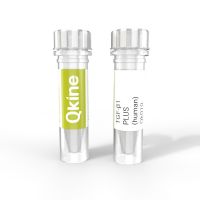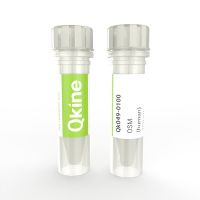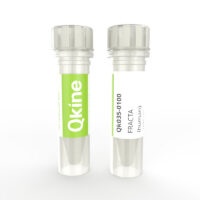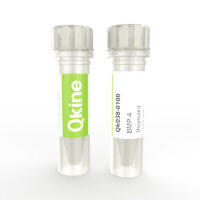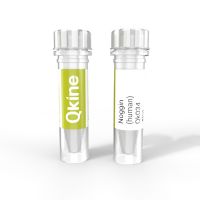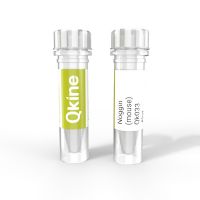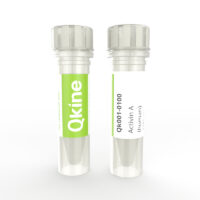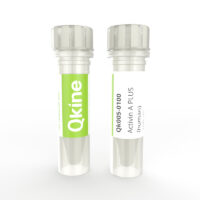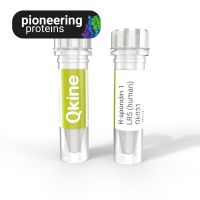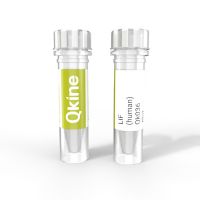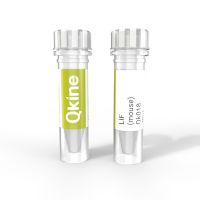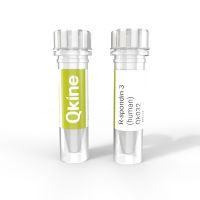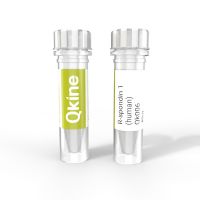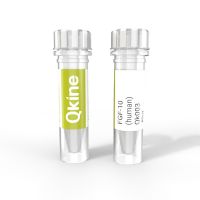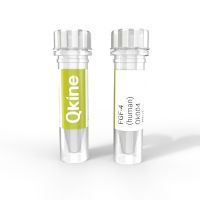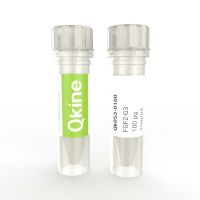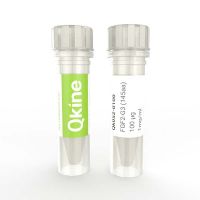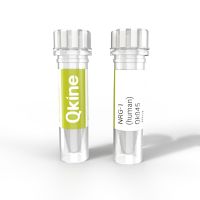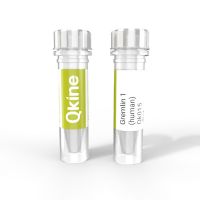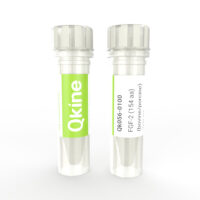- Transforming growth factor-beta 1 (TGF-β1) is a pleiotropic cytokine that regulates various cellular processes, including cell proliferation, growth, differentiation, motility, and apoptosis. It is an essential growth factor in many embryonic and induced pluripotent stem cell maintenance media, including the commonly used E8, StemPro, and mTeSR media. TGF-β1 also promotes the differentiation of various cell types such as fibroblasts, epithelial cells, and immune cells.Human/bovine/porcine recombinant TGF-β1 PLUS protein is the first entirely animal-free recombinant human TGF-β1 protein for highly reproducible results and compatible with chemically-defined stem cell media.TGF-β1 PLUS is a high purity 24 kDa dimer comprising optimized mature domain of TGFβ1 protein, animal-free (AF) and carrier-protein free (CF). Our TGF-β1 PLUS protein has been extensively tested for maintenance of iPSC pluripotency by the specialist stem cell biotechnology company, Stemnovate, Cambridge, UK.*Benchmark our TGF-β1 PLUS against your existing supplier*
- Human OSM protein (oncostatin M) is used in the differentiation of human pluripotent stem cells into hepatocyte-like cells. OSM also plays roles in osteogenesis and neurogenesis, and is an important regulator of the hematopoietic stem cell niche in the bone marrow. Qkine human oncostatin M protein is high purity and animal and carrier-protein free for reproducible results.
- Follistatin-resistant activin A protein (FRACTA) has been engineered to prevent binding to the natural inhibitor, follistatin. Activin A activity protein is regulated in vivo by follistatin, a high-affinity inhibitor; follistatin accumulates in stem cell culture, where it inhibits activin A.Qk035 follistatin-resistant activin A protein (FRACTA) has equivalent bioactivity to wild-type activin A (Qk001) but does not bind follistatin so is resistant to feedback inhibition. High purity 26 kDa dimer comprising engineered mature domain of activin A protein, animal-free (AF) and carrier-protein free (CF). This specialised activin A has been developed in Marko Hyvönen’s group in the University of Cambridge.
- Human BMP4 protein (bone morphogenetic protein 4) is a key regulator of embryogenesis and supports the differentiation of embryonic stem cells and induced pluripotent stem cells. In addition, BMP4 protein plays roles in the differentiation of mesenchymal cells to adipocytes, epithelial cancer EMT, and regulating neuronal and glial cell development.Highly pure 24 kDa disulfide–linked bioactive dimer comprised of the mature domain of human BMP4 protein (animal-free and carrier protein-free).
- Human noggin is a bone morphogenetic protein (BMP) family antagonist used in the culture of intestinal, pancreatic, lung and tumor-derived organoids, maintenance of undifferentiated embryonic stem cells and for stem cell differentiation into neural and microglial lineages.Qkine human noggin protein is a highly pure 46kDa bioactive dimer for reproducible results in organoid culture.
- Mouse/rat noggin is a bone morphogenetic protein (BMP) family antagonist used in the culture of intestinal, pancreatic, lung and tumor-derived organoids, maintenance of undifferentiated embryonic stem cells and for stem cell differentiation into neural and microglial lineages.Qkine recombinant mouse noggin protein is a highly pure 46kDa bioactive dimer for reproducible results (animal-free and carrier-protein free).
- Activin A is a TGF-β family growth factor regulating embryonic development, cell proliferation, differentiation, and immune responses. Activin A is frequently used to maintain pluripotency in induced pluripotent and embryonic stem cell cultures. It is also used in many stem cell differentiation protocols, including endoderm lineage differentiation and further maturation into hepatocyte and pancreatic cells. Recombinant human/mouse/rat/bovine/porcine activin A protein is a high-purity mature bioactive dimer of 26 kDa. It is animal-free, carrier protein-free, and tag-free to ensure its purity with exceptional lot-to-lot consistency. This protein has been rigorously benchmarked against other commercial sources and extensively validated for highly reproducible stem cell culture. Qkine founder Marko Hyvönen developed the protocol for making high-purity activin A, and this protein is used at the Cambridge Stem Cell Institute. High purity mature bioactive dimer. Animal-free (AOF) and carrier-protein free (CF). Rigorously benchmarked against other commercial sources.
- Human/mouse/rat Activin A PLUS ™ protein is an optimised biologically active truncation of the mature domain of human Activin A protein. The EC50 and activity in stem cell culture of activin A PLUS is equivalent to the full mature domain activin A.High purity 24 kDa dimer comprising truncated mature domain of activin A protein, animal-free (AF) and carrier-protein free (CF). Recombinant Activin A PLUS is designed to be manufactured at scale for cost-effective, large-scale stem cell culture applications.
- Recombinant human r-spondin 1 LR5 protein is engineered to act as a high affinity ligand for the LGR5 receptor. In epithelial tissues LGR5 marks the stem cell population. This engineered protein, R-spondin 1 LR5, activates wnt signalling only in the LGR5+ stem cell population. R-spondin1 LR5 has been tested in intestinal organoid culture and supports organoid survival and growth. As LGR5 specifically marks stem cells and is not found on transit amplifying cells, the lower crypt multiplicity seen in organoid cultures with R-spondin 1 LR5 (in comparison to wild-type R-spondin 1, Qk006) supports the notion that this engineered form is acting specifically on stem cells. This specialized form of R-spondin 1 was developed in Marc de la Roche’s lab (University of Cambridge).
- Human LIF (leukemia inhibitory factor) protein suppresses the differentiation of murine embryonic stem cells (ESCs) and is widely used in ESC and iPSC culture.1 Qkine human LIF protein is high purity and animal and carrier-protein free for reproducible results.
- Mouse LIF (murine leukemia inhibitory factor) protein maintains the pluripotency and self-renewal of mouse embryonic and induced pluripotent stem cells. Qkine recombinant mouse LIF protein is animal-free and carrier-protein free for highly reproducible results. Bioactivity was tested by colony formation assay and determination of Nanog expression.1
- Human R-spondin 3 protein potentiates Wnt signalling in and has been shown to function in crypt regeneration in the intestine and control stem cell and progenitor cell behaviour during kidney development. R-spondin 3 is used alongside R-spondin 1 in intestinal organoid culture systems.17kDa highly pure, bioactive domain of human R-spondin 3 comprising the two cysteine-rich furin-like domains, which are necessary and sufficient for Wnt signalling potentiation and are the essential domains for activity in stem cell and organoid culture. Animal-free and carrier-protein free.
- R-spondin 1 protein (RSPO1) is the prototypic member of the R-spondin family and is used to potentiate Wnt signaling in many organoid culture systems including intestinal and tumor (cancer) organoid culture. R-spondin 1 is also required for hematopoietic stem cell specification and cancer cell migration and survival.Recombinant human R-spondin 1 protein (RSPO1) protein is the bioactive domain of human R-spondin 1 comprising the two cysteine-rich furin-like domains of R-spondin 1. Those are necessary and sufficient for Wnt signaling potentiation and are the essential domains for activity in stem cell and organoid culture.This protein has a molecular weight of 13 kDa and is animal-free, carrier protein-free, and tag-free to ensure its purity with exceptional lot-to-lot consistency. Qk006 is suitable to replace R-spondin conditioned media for improved reproducibility in chemically defined organoid culture media.
- Human/rat/porcine/bovine FGF10 protein promotes lung organoid formation and induces branching morphology. FGF10 protein is used widely in organoid culture, embryonic stem cell (ESC) and induced-pluripotent stem cell (iPSC) differentiation, and for the study of epithelial to mesenchymal transition and tumor metastasis.High purity and bioactivity 17 kDa, bioactive domain of human fibroblast growth factor 10, animal-free (AOF) and carrier-protein free (CF).
- Human FGF-4 protein is used for the proliferation and differentiation of embryonic and induced-pluripotent and tissue (mesenchymal) stem cells and promotes neural stem cell proliferation. FGF-4 is an important component of cardiac, intestinal and other organoid culture media.High purity and bioactivity 14 kDa, bioactive domain of human fibroblast growth factor 4, animal origin free (AOF) and carrier-protein free.
- Recombinant FGF2-G3 (FGF2-STAB®) protein is a thermostable engineered form of FGF-2 (bFGF). Qk053 is the 154 aa mature domain of FGF-2 (Qk027) with nine amino acid substitutions to enhance stability without impacting bioactivity developed by Dvorak et al. 2018. This increases the functional half-life of the protein from <10 h (wild-type) to >7 days (FGF2-G3).Recombinant FGF2-G3 is used in B8 media (Kuo et al. 2019) for weekend free, high homogeneity induced pluripotent stem cell culture. FGF2-G3 also has applications in chemically defined stem cell and organoid culture media, and cultured meat media development.High purity 17 kDa bioactive FGF2-G3 protein. Animal-free (AOF), carrier protein-free and with no His-tag.
- FGF2-G3 (145 aa) protein is a thermostable engineered form of FGF-2 (bFGF). Qk052 comprises the 145 aa form of FGF-2 (Qk025) with the nine amino acid substitutions developed by Dvorak et al. 2018. This increases the functional half-life of the protein from <10 h (wild-type) to >7 days (FGF2-G3 145 aa).FGF2-G3 is used in B8 media (Kuo et al. 2019) for weekend free, high homogeneity induced pluripotent stem cell culture. This new 145 aa thermostable FGF-2 protein allows direct comparison of efficacy in systems using FGF-2 145 aa (Qk025) for chemically defined stem cell and organoid culture media, and cultured meat media development.High purity 16 kDa bioactive FGF2-G3 145 aa protein. Animal-free (AOF), carrier protein-free and with no His-tag.
- Human NRG-1 protein (Neuregulin 1) is frequently used in the maintenance of human pluripotent stem cells. In addition to its widespread use in stem cell culture media, NRG-1 (also known as Heregulin-β1 , HRG-1) has essential roles in vivo including in nervous system, cardiac, and mammary gland development; cancer biology and neurological disorders.7.5 kDa highly pure, bioactive domain of human NRG-1, comprised of the β isoform of the EGF-like domain of NRG-1 (HRG1-B1). This NRG-1 protein monomer is animal-free (AF) and carrier-protein free (CF).
- Human/bovine/porcine Gremlin 1 protein is a BMP-inhibitor present in the natural intestinal niche and provides an alternative to Noggin for optimisation of intestinal organoid culture and iPSC differentiation.Qk015 has been optimized by our experts for exceptionally high-purity production in E.coli and bioactivity. 18 kDa high purity dimeric protein, animal-free and carrier protein free
- Recombinant bovine/porcine FGF2 protein 154 aa (bFGF/basic FGF), this is the long form of FGF-2 used for the development of optimized serum-free culture media for species-specific bovine (cow) and porcine (pig) cultivated meat and veterinary research applications. Used in comparative media optimization studies with Qk040 porcine/bovine FGF-2 145 aa.FGF-2 is used extensively in the maintenance and proliferation of induced pluripotent (iPSC) and embryonic stem cells (ESC)1-3 and for enhancement of proliferation in primary cell culture.High purity 16 kDa FGF-2 / bFGF 154 aa protein, animal origin free (AOF) and carrier-protein free (CF).
